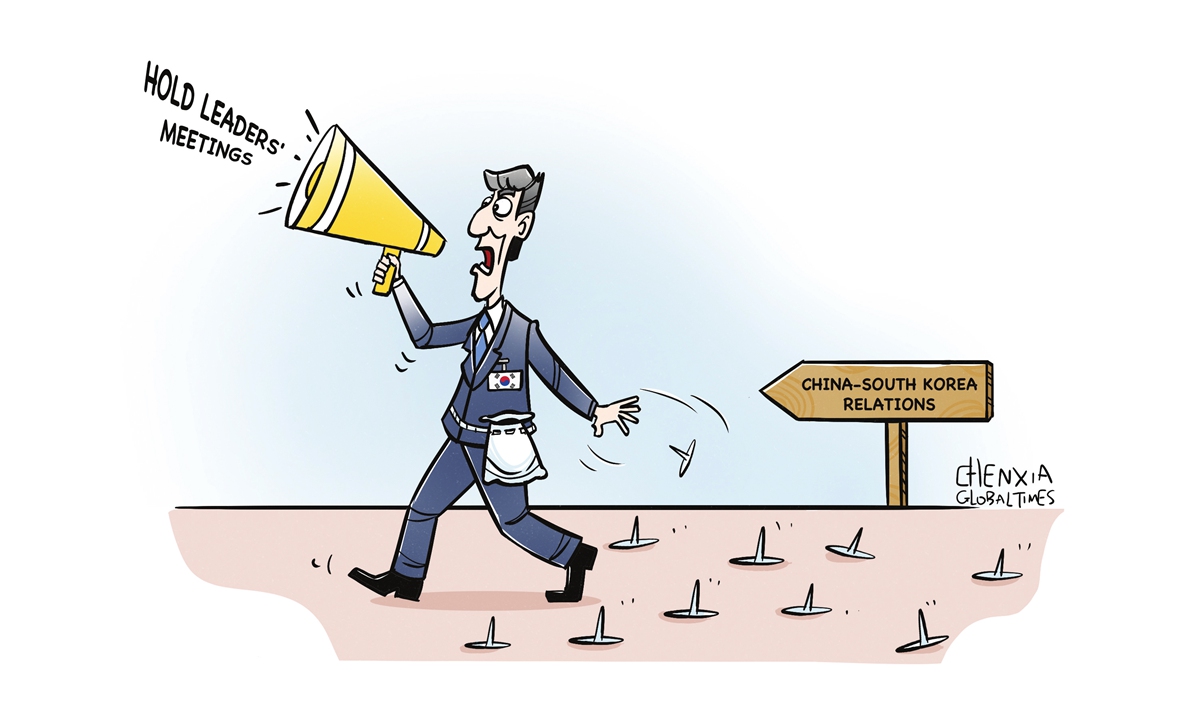
South Korean President Yoon Suk-yeol said at the ASEAN Summit on Wednesday that his country plans to work closely with China and Japan to revive trilateral cooperation mechanisms in the near future, including a summit between the three countries. While Yoon's appeal may reflect his willingness, South Korea's recent actions seem to be the opposite.
After the conclusion of Camp David trilateral summit with the US and Japan, South Korea began to emphasize the importance of its relations with China. It seems to think that it will become a "global pivotal country," and that it can carry out the so-called mutualism with China after strengthening its relations with the US and Japan. In fact, China will not attach more importance to South Korea merely because it is tied to the US and Japan. Quite the contrary, we feel that Seoul has further weakened its autonomy.
If the Yoon administration really valued China-South Korea relations, it should not have given up its positioning in the strategic and cooperative partnership between the two countries after coming to power, and should not have overturned the "three nos and one restriction" concerning the THAAD system made by the previous administration - no additional deployment of the THAAD system in South Korea; no participation in a US-led missile defense network; no involvement in a trilateral military alliance with the US and Japan; and restriction in the use of the THAAD system deployed. It also should not have frequently touched China's red line on issues related to the island of Taiwan, the South China Sea, and Xinjiang. In addition, it should not have asked China to comply with the US rhetoric on international order, interfered in the Chinese ambassador's normal activities without any justification, or participated in the coteries that target China all the time.
After South Korea has put enough obstacles in its relations with China, it frequently makes high-profile requests for communication with China. This is actually asking China not to pay attention to Seoul's anti-China moves but to support South Korea's diplomacy so that Seoul can prove the legitimacy and effectiveness of its foreign policy adjustments at home.
In fact, South Korea's version of the Indo-Pacific Strategy published last year placed China-Japan-South Korea cooperation only in an extremely unimportant position, emphasizing cooperation merely on climate change and energy security. This is a true reflection of the fact that Seoul indeed does not attach importance to the trilateral cooperation. And even if it does, it is only to show its "diplomatic leadership."
China's diplomacy is characterized by truthfulness, sincerity, and honesty. It does not say one thing and do another, nor does it try to gang up some countries against others. It logically doesn't make sense for Seoul to participate in the coteries that divide regional cooperation in Northeast Asia while advocating the China-Japan-South Korea trilateral summit that aims to boost regional cooperation. South Korea must also be clear that the meeting between the three countries should be a platform for them to discuss cooperation, not a tool for the US to impose its will on the region through South Korea and Japan.
China will be pleased to see the successful holding of a potential China-Japan-South Korea trilateral talk. After all, history has proved that it is in the common interest of the three countries and in line with the general trend of regional development. However, good bilateral ties are the basis for any trilateral cooperation.
South Korea should not only take substantive measures to improve its relations with China, but also seriously set an agenda that will help to truly promote regional cooperation. It should actively create a friendly atmosphere for the success of the trilateral meeting to prove that it has sufficient sincerity, instead of merely calling on talks on various occasions as if the failure of such a meeting is the responsibility of other countries. In particular, if South Korea is pushing for the China-Japan-South Korea trilateral talk because of US instructions, it would be better not to hold the meeting at all.
The author is the director and professor of the Center for Korean Peninsula Studies at the Shanghai University of International Business and Economics. opinion@globaltimes.com.cn


